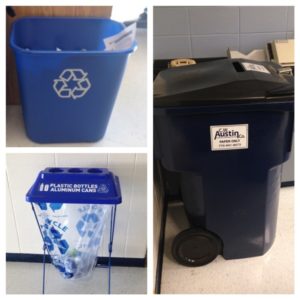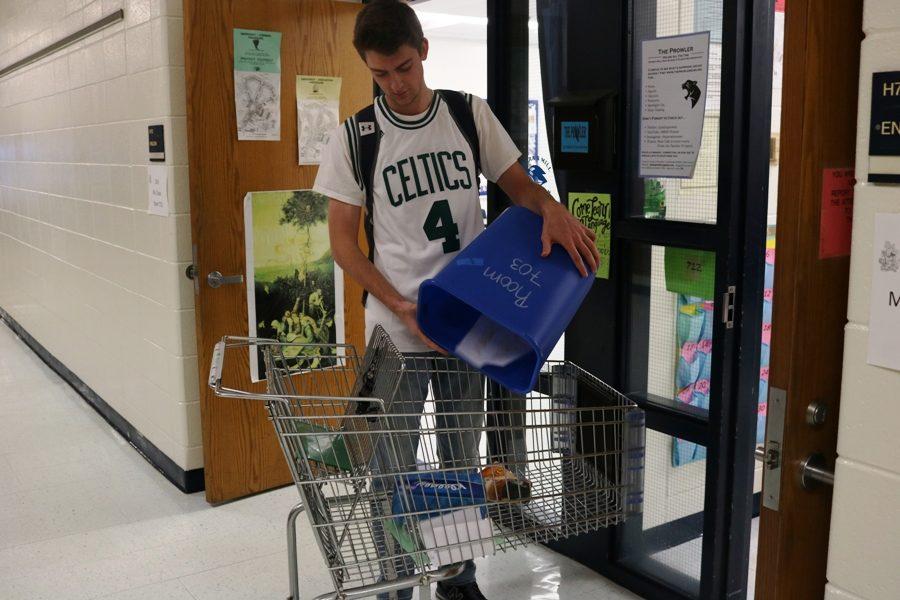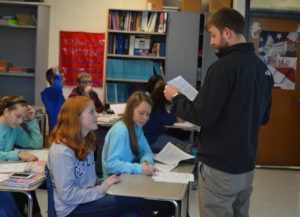Starr’s Mill earns a green star for recycling
Every Friday, students from business teacher Jeffrey Klein’s entrepreneurial class dump the blue recycling bins in each classroom into a shopping cart. The cart is eventually taken to the recycling dumpsters outside of the cafeteria.
March 19, 2017
The status of recycling at Starr’s Mill is one that has been questioned again and again by students. Senior Sydney Soto has asked the million-dollar question multiple times: “Do the recycling bins actually get taken to the recycling or are they just trashed?”
Much to her surprise, recycling is very much still an active part in the weekly Panther nation “to-do” list. “Several years ago, the county decided to give us [the blue recycling bins] so each teacher would have a chance to recycle items,” business teacher Jeffrey Klein said. Klein doesn’t just recycle materials from his classroom, each Friday, Klein’s entrepreneurship students are in charge of dumping the contents of the bins into a shopping cart to dump into the recycling container outside the cafeteria. “This class has been doing this since the class’s beginning, which was seven years ago,” Klein said.

Students can find the blue recycling bins, which fill with paper cardboard, plastic bottles, glass, and aluminum, and the long, clear, bags, which are for plastics only are, littered throughout the school to improve recycling in the community. There are also large recycling cans in each teacher workroom for wasted paper. According to Keep Peachtree City Beautiful director, Al Yougel, the most common materials collected in high schools are “cardboard and a tremendous amount of plastic.”
Oftentimes, Klein and his students receive some help from the custodial staff when the bins get full, as there are over 80 classrooms in the school. “If I see the bins full, I dump them [in the recycling dumpsters right outside the cafeteria],” head custodian Tri Ha said.
The school’s Eco Club also enjoys dumping recyclable materials just as much as Klein’s students. They hope to “encourage plastic recycling,” Eco Club sponsor Robin Huggins said. In order to fulfill this project, during its beginning years, the Eco Club reached out to the Keep Peachtree City beautiful organization to get started. “They provided the bins for the building and the stadium,” Huggins said.
The Keep Peachtree City Beautiful organization, according to their website, also provides “a community-focused initiative dedicated to controlling litter, reducing waste, and supporting beautification efforts.” Director of Keep PTC Beautiful, Al Yougel, expanded on the mission statement and said that “the initial concern on the part of Peachtree City was a littler problem,” Yougel said. “We [the Keep PTC Beautiful organization] were asked to give some attitudes about the litter and create a program to try and control the amount of litter. At the same time, there was a very small recycling effort in town.” Yougel and the rest of the Keep PTC Beautiful team decided that they had to work on “not only litter, but also [they needed] to start recycling, or at least improve recycling,” Yougel said.
Making this change for the better began with identifying three principles: “one was residential recycling, the second was a drop-off station [for recycling materials to be delivered to] and third was school involvement,” Yougel said.
Achieving school involvement turned out to be no easy feat. In their attempt to make contact with each of the 11 schools in the Fayette County Education System, the Keep PTC Beautiful organization “found out that there was no policy or attempt [to recycle]. Everything was up to each individual school about how much they got involved and how enthusiastic they were with their recycling efforts,” Yougel said.
Despite this challenge, Keep PTC Beautiful was successful in establishing relationships with several of the county’s schools. “Huddleston Elementary builds gangbusters with their paper and cardboard and the kids even argue about who gets to take out the recycling to the curb. Booth is very active in their recycling. In fact, the principal made a rack to place their cardboard in on the loading dock so it would be there when we came by,” Yougel said. “Of course, the Starr’s Mill Eco Club is great, and makes Starr’s Mill one of the stars in recycling.”
One thing that contributes to the Mill’s shining recycling reputation is the Eco Club’s second mode of collecting recyclable materials. The long, clear, plastic bags located near courtyard doors, in the rotunda, and inside and outside the cafeteria are under Eco Club jurisdiction. “Those bags are for plastic only. No cans or trash is allowed,” Huggins said. Similar to when the blue recycling bins in classrooms fill up, the custodial staff also assists in collecting the bags when they fill and place them outside for Keep PTC Beautiful to pick up.
It seems as though several groups at the Mill are aware of the recycling methods at the Mill, but somehow the student body still seems to fall short with their recycling efforts. This can be seen when regular trash is placed in recycling only locations. “I’ve seen plenty of normal trash in the recycling bins around the school. When it gets gross, I have to dump the entire bin, even though there is still recyclable materials underneath,” Ha said.
It’s actions like these that still prompts people to wonder if recycling is a priority at Starr’s Mill. Through Klein’s eyes “recycling was more of a priority in earlier years. People gave it more attention when the bins first came around,” Klein said. However, he and the rest of his business class students remain “eager to help all [they] can” to improve the status of recycling at Starr’s Mill.
One thing is for sure, the effort for recycling is not automatic. “You have to generate the enthusiasm,” Yougel said.








